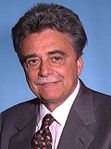1992 Italian Senate election in Lombardy
| |||||||||||||||||||||||||||||||||||||||||
All 48 Lombard seats to the Italian Senate | |||||||||||||||||||||||||||||||||||||||||
|---|---|---|---|---|---|---|---|---|---|---|---|---|---|---|---|---|---|---|---|---|---|---|---|---|---|---|---|---|---|---|---|---|---|---|---|---|---|---|---|---|---|
| |||||||||||||||||||||||||||||||||||||||||
| |||||||||||||||||||||||||||||||||||||||||
Lombardy elected its eleventh delegation to the Italian Senate on April 5, 1992.[1] This election was a part of national Italian general election of 1992 even if, according to the Italian Constitution, every senatorial challenge in each Region is a single and independent race.
The election was won by the centrist Christian Democracy, as it happened at national level. Seven Lombard provinces gave a majority or at least a plurality to the winning party, while the Swiss-bordering Province of Varese and Province of Como preferred the federalist Northern League.
Background
[edit]After quite five decades of exceptional political stability, the election of 1992 marked a revolution. Umberto Bossi's Northern League, acting as a catch-all party, took votes from all other parties on a base of tax protest and a federalist project. Christian Democracy lost more than in the previous 30 years, the former Communists, now divided between the Democratic Party of the Left and the Communist Refoundation Party, more than ever, as well as all the other parties.
Electoral system
[edit]The electoral system for the Senate was a strange hybrid which established a form of proportional representation into FPTP-like constituencies. A candidate needed a landslide victory of more than 65% of votes to obtain a direct mandate. All constituencies where this result was not reached entered into an at-large calculation based upon the D'Hondt method to distribute the seats between the parties, and candidates with the best percentages of suffrages inside their party list were elected.
Results
[edit]| Party | votes | votes (%) | seats | swing |
|---|---|---|---|---|
| Christian Democracy | 1,414,109 | 25.2 | 14 | |
| Northern League | 1,150,022 | 20.5 | 11 | |
| Democratic Party of the Left | 726,737 | 12.9 | 7 | |
| Italian Socialist Party | 694,008 | 12.4 | 7 | |
| Communist Refoundation | 316,355 | 5.6 | 3 | |
| Italian Republican Party | 232,292 | 4.1 | 2 | = |
| Italian Social Movement | 197,110 | 3.5 | 1 | |
| Federation of the Greens | 175,721 | 3.1 | 1 | = |
| Italian Liberal Party | 143,473 | 2.6 | 1 | = |
| Lombard Alpine League | 119,153 | 2.1 | 1 | |
| Others & PSDI & PR | 452,169 | 8.0 | - | |
| Total parties | 5,621,749 | 100.0 | 48 | = |
Sources: Italian Ministry of the Interior
Note: PRC as a spinoff of PCI/PDS merged with DP.
Constituencies
[edit]- No senator obtained a direct mandate. Please remember that the electoral system was, in the other cases, a form of proportional representation and not a FPTP race: so candidates winning with a simple plurality could have (and usually had) a candidate (usually a Christian democrat) with more votes in their constituency.
Substitutions
[edit]- Paolo Gibertoni for Mantua (20.3%) replaced Luigi Moretti in 1992. Reason: resignation.
Notes
[edit]- ^ Martin J. Bull & James L. Newell, "Italian Politics and the 1992 Elections: From 'Stable Instability' to Instability and Change"
- ^ MP Ignazio La Russa helped his party running for this seat. However, according to the Italian Constitution, MPs can't be senators, so he ceded his senatorial seat to his party-mate Giuseppe Resta.
- ^ MP Fulco Pratesi helped his party running for this seat. However, according to the Italian Constitution, MPs can't be senators, so he ceded his senatorial seat to his party-mate Emilio Molinari.



